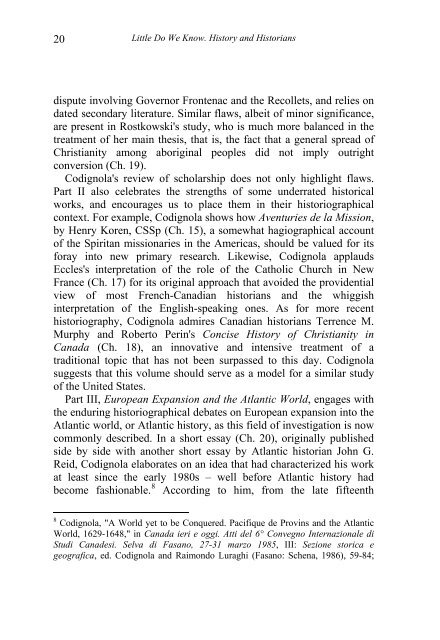Untitled - Istituto di Storia dell'Europa Mediterranea - Cnr
Untitled - Istituto di Storia dell'Europa Mediterranea - Cnr
Untitled - Istituto di Storia dell'Europa Mediterranea - Cnr
Create successful ePaper yourself
Turn your PDF publications into a flip-book with our unique Google optimized e-Paper software.
20<br />
Little Do We Know. History and Historians<br />
<strong>di</strong>spute involving Governor Frontenac and the Recollets, and relies on<br />
dated secondary literature. Similar flaws, albeit of minor significance,<br />
are present in Rostkowski's study, who is much more balanced in the<br />
treatment of her main thesis, that is, the fact that a general spread of<br />
Christianity among aboriginal peoples <strong>di</strong>d not imply outright<br />
conversion (Ch. 19).<br />
Co<strong>di</strong>gnola's review of scholarship does not only highlight flaws.<br />
Part II also celebrates the strengths of some underrated historical<br />
works, and encourages us to place them in their historiographical<br />
context. For example, Co<strong>di</strong>gnola shows how Aventuries de la Mission,<br />
by Henry Koren, CSSp (Ch. 15), a somewhat hagiographical account<br />
of the Spiritan missionaries in the Americas, should be valued for its<br />
foray into new primary research. Likewise, Co<strong>di</strong>gnola applauds<br />
Eccles's interpretation of the role of the Catholic Church in New<br />
France (Ch. 17) for its original approach that avoided the providential<br />
view of most French-Cana<strong>di</strong>an historians and the whiggish<br />
interpretation of the English-speaking ones. As for more recent<br />
historiography, Co<strong>di</strong>gnola admires Cana<strong>di</strong>an historians Terrence M.<br />
Murphy and Roberto Perin's Concise History of Christianity in<br />
Canada (Ch. 18), an innovative and intensive treatment of a<br />
tra<strong>di</strong>tional topic that has not been surpassed to this day. Co<strong>di</strong>gnola<br />
suggests that this volume should serve as a model for a similar study<br />
of the United States.<br />
Part III, European Expansion and the Atlantic World, engages with<br />
the enduring historiographical debates on European expansion into the<br />
Atlantic world, or Atlantic history, as this field of investigation is now<br />
commonly described. In a short essay (Ch. 20), originally published<br />
side by side with another short essay by Atlantic historian John G.<br />
Reid, Co<strong>di</strong>gnola elaborates on an idea that had characterized his work<br />
at least since the early 1980s – well before Atlantic history had<br />
become fashionable. 8 Accor<strong>di</strong>ng to him, from the late fifteenth<br />
8 Co<strong>di</strong>gnola, "A World yet to be Conquered. Pacifique de Provins and the Atlantic<br />
World, 1629-1648," in Canada ieri e oggi. Atti del 6° Convegno Internazionale <strong>di</strong><br />
Stu<strong>di</strong> Canadesi. Selva <strong>di</strong> Fasano, 27-31 marzo 1985, III: Sezione storica e<br />
geografica, ed. Co<strong>di</strong>gnola and Raimondo Luraghi (Fasano: Schena, 1986), 59-84;


